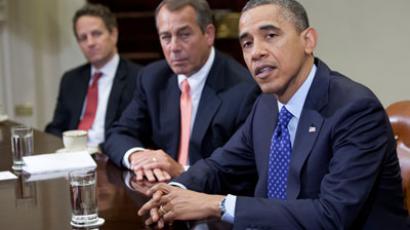House approves ‘fiscal cliff’ deal
After Republicans dropped their demands for additional spending cuts the House approved legislation meant to avert the ‘fiscal cliff’. The representatives lined up 257 to 167 in favor of the bill.
Earlier, the House Republicans expressed their opposition to the measure to avert the ‘fiscal cliff’ in its current form. GOP leaders were considering an amendment that would add some $330 million in government spending cuts besides the cuts proposed by the bill. But after they failed to get enough votes to pass such an amendment Republicans decided to proceed with a vote on the measure as it stood.Democratic leaders were pressing house speaker John Boehner to proceed with the vote on the Senate approved compromise legislation. Following a private meeting between Vice President Joe Biden and House Democrats on Tuesday, minority leader Nancy Pelosi said the Democrats expected Boehner to allow the House to vote on the deal, which had been approved by Senate overnight on New Year's Eve.
Stepping back from the Fiscal Cliff
In the early hours of the 2013, US politicians finally agreed a deal on tax and spending. The 48 page fiscal cliff compromise was passed by the Senate with an overwhelming 89-8 vote. It stipulates raising income tax for individuals making $400,000 and couples earning $450,000 from 35 percent to 39.6 percent and to permanently extend Bush-era tax cuts for those earning less than $400,000 annually.The legislation also proposes a one-year extension on unemployment insurance benefits, which are about to expire for 2 million people, and seeks to delay a sharp decrease in Medicare payments for medical staff.The bill does not contain any cuts to entitlement programs such as Social Security and Medicare. It also does not tackle of raising the debt ceiling from the current limit of $16.4 trillion, which the US is about to cross.Critics of the bill say it does not address real concerns. “Much of the debt, 16 trillion dollars is worthless; it should not even be paid. And we are debating what kind of cuts we have to make,” Lawrence Freeman, editor of the Intelligence Review Magazine, told RT.What the Capital Hill should focus on, Freeman suggest, is avoiding the risk of hyperinflation in 2013.“You may know that this month, in January, Bernanke, the Chairman of the Federal Reserve, will be purchasing over $100 billion a month of mortgage backed securities, insurance securities – and that will lead to hyperinflation. So both parties are supporting that,” Freeman explained.Therefore “the tax question is a bogus issue” the analyst argues “the question is what kind of credit you are going to make available for investment in infrastructure, in jobs and energy and in rebuilding New York and New Jersey. The government has the power to generate credit for public credit projects.”Without this Freeman says that it will cause more hardship for the “27 million people unemployed or misemployed” and the 49.7 million Americans living in poverty. The expert further warns that “this hyperinflation New Year policy of Bernanke supported by both Republican and Democrats will destroy the US economy as we’re seeing now in Europe, in Greece and Spain.”













